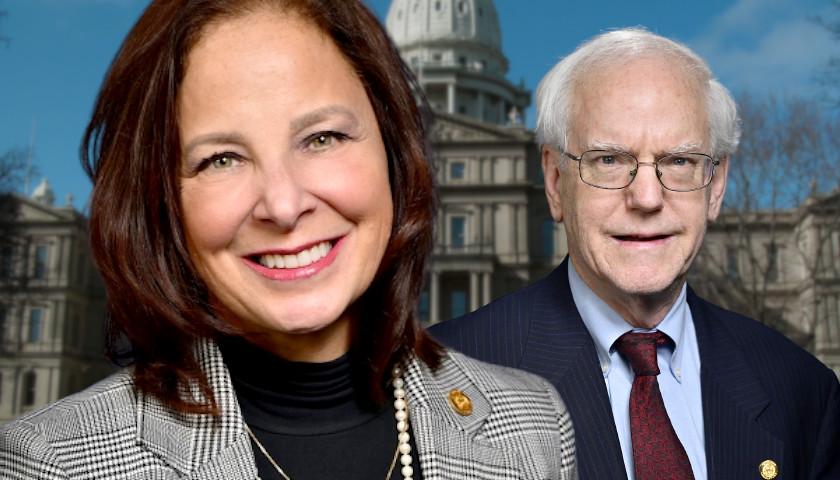by Scott McClallen
After a record $82 billion budget that nearly depleted a $9 billion surplus, two bills aim to make Michigan’s budgeting process more transparent.
Reps. Tom Kuhn (pictured above, right), R-Troy and Donni Steele (pictured above, left), R-Orion Township, introduced House Bills 5296 and 5297 that aim to require that lawmakers can’t change existing laws through an appropriations bill.
Under bill language, lawmakers also would be guaranteed access to any general appropriation bill at least 168 hours, or one week in advance during a regular session and 72 hours in advance during a special session.
Often, billions of taxpayer dollars are allocated behind closed doors that get voted on by lawmakers who haven’t read the entire bill. For example, the nonpartisan Citizens Research Council of Michigan found that Michigan lawmakers stuffed $881 million – 65% of the $1.3 billion of 2024 budget earmarks –into the final bill with just hours before the deadline.
“The days of lawmakers getting billions of dollars of budget bills thrust onto our desks with mere minutes to review should be over,” Steele said in a statement. “Our plan takes a good look into the way we do business and how we can make the appropriations process more transparent and accountable through advanced notice and documentation. We can do better with taxpayer dollars.”
The bills seek to require that conference committee negotiations, where members of the House and Senate bring forward their chamber’s budget plan, are limited to the differences between bills. The plan attempts to require that budget items already agreed upon by both sides couldn’t be altered during these meetings.
Under the bills, those conference committees would be banned from adding new items that weren’t in either chamber’s final version of the appropriations bill, preventing last minute trading for votes with taxpayer funds.
The bill says Senate and House appropriations committees would have to report general appropriations bills for the upcoming fiscal year within 90 days of the start of the legislative session, starting the budget process sooner.
“The way legislators currently do business is broken,” Kuhn said in a statement. “Each legislator should be given ample time to become deeply familiar with budget bills before voting. By setting specific rules, our bills will hold legislators accountable for their actions. We are creating clear rules and timelines to overhaul and improve the efficiency of the budgeting process.”
– – –
Scott McClallen is a staff writer covering Michigan and Minnesota for The Center Square. A graduate of Hillsdale College, his work has appeared on Forbes.com and FEE.org. Previously, he worked as a financial analyst at Pepsi. In 2021, he published a book on technology and privacy. He co-hosts the weekly Michigan in Focus podcast.





